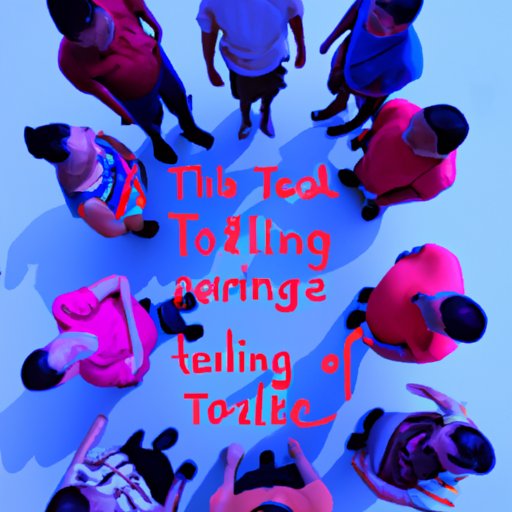Introduction
Cancel culture has become an increasingly prominent phenomenon in recent years, with people being “canceled” for a variety of reasons, from voicing controversial opinions to making offensive comments or engaging in inappropriate behavior. But what exactly does it mean to be “canceled”? According to Merriam-Webster, to “cancel” is to “call off or decide not to participate in something”. In this context, cancel culture is the practice of withdrawing support for someone or something, usually in a public way, due to their offensive behavior or beliefs.
The problem with cancel culture is that it often involves publicly shaming and ostracizing individuals without giving them a chance to explain themselves. This can have serious emotional and social repercussions, ranging from fear and anxiety to increased levels of stress and even depression. In this article, we’ll take a closer look at why cancel culture is toxic and examine the potential long-term consequences of engaging in it.
Examining the Emotional Impact of Cancel Culture
When someone is canceled, they may experience a range of negative emotions, from fear and anxiety to stress and depression. For instance, research conducted by the University of Michigan found that those who had been “canceled” experienced a heightened sense of fear, anxiety, and stress. The study also found that these feelings were amplified when the person felt that their reputation was being threatened or damaged.
The fear of being canceled can be especially intense, as it can lead to feelings of powerlessness and vulnerability. People may fear that they will be judged harshly and that there is no way to defend themselves, even if they feel they are in the right. This can be particularly difficult for those who are already marginalized and don’t have a large platform to speak out on their own behalf.
The anxiety of being judged can also be overwhelming, as it can lead to a feeling of being constantly under scrutiny. People may worry that any mistake they make could lead to them being canceled, which can be a source of immense stress. This can also lead to feelings of paranoia, as people become increasingly wary of speaking out or expressing their opinions for fear of being judged.
Finally, the stress of feeling unsafe can be very damaging, as it can lead to feelings of isolation and alienation. People may feel like they are unable to express themselves freely without fear of judgment or attack, which can be incredibly detrimental to both their mental and physical health.

The Implications of Social Media on Cancel Culture
Social media has played a major role in the rise of cancel culture, as it provides a platform for people to quickly spread rumors and false information. This can be especially damaging, as it can lead to people being unfairly judged or labeled without having a chance to explain their actions or beliefs.
Social media can also encourage groupthink, which is the tendency for people to follow the opinions of the majority instead of forming their own. This can be problematic, as it can lead to a lack of critical thinking and an unwillingness to challenge popular opinion. This can also lead to an unhealthy echo chamber, where only certain opinions and viewpoints are heard and respected.

How Cancel Culture Promotes Intolerance and Ignorance
Cancel culture can also promote intolerance and ignorance, as it encourages people to conform to popular opinion without considering other perspectives. This can lead to a lack of critical thinking and an unwillingness to engage in meaningful debate. It can also lead to people dismissing opposing views out of hand, as they feel that they must agree with the majority in order to avoid being canceled.
Furthermore, cancel culture can create an environment of fear and intimidation, as people may feel pressured to stay silent in order to avoid being judged or attacked. This can lead to an atmosphere of censorship, as those who disagree with the majority are afraid to speak out for fear of retribution.

Exploring the Effects of Group Think in Cancel Culture
Groupthink is a dangerous phenomenon that can lead to poor decision-making, as people may be more inclined to accept the opinions of the majority rather than critically assess the situation. This can lead to a lack of creativity and innovation, as people are unwilling to challenge the status quo. It can also lead to a sense of complacency, as people may be less likely to question authority or take risks.
Groupthink can also make it difficult to challenge group opinions, as people may fear being ostracized or judged if they disagree. This can lead to a lack of diversity of thought, as people may be less likely to consider different points of view. It can also lead to a sense of conformity, as people may feel pressured to conform to popular opinion in order to fit in.
What Role Does Technology Play in Canceling People?
Technology has also played a key role in the rise of cancel culture, as it has allowed for rumors and false information to be spread quickly and easily. This can lead to people being unfairly judged or labeled without having a chance to explain their actions or beliefs. It can also lead to online harassment and cyberbullying, as people may be targeted for their opinions or beliefs.
Technology can also amplify voices, which can lead to people feeling like their opinions are not being heard or respected. This can lead to feelings of frustration and anger, as people may feel like their voices are not being taken seriously. It can also lead to a sense of powerlessness, as people may feel like they have no control over the situation.
The Long-Term Consequences of Cancel Culture
The long-term consequences of cancel culture can be extremely damaging, as it can lead to a loss of trust and an increase in divisive political ideologies. It can also have a negative effect on mental health, as people may feel isolated, alienated, and powerless. Furthermore, it can lead to a decrease in open dialogue and an increase in censorship, as people may be afraid to voice their opinions for fear of being judged or attacked.
In addition, cancel culture can lead to an erosion of civil liberties, as people may be less willing to stand up for their rights and beliefs. This can lead to a decrease in civic engagement, as people may be less likely to participate in the political process. Finally, it can lead to an increase in tribalism, as people may be more likely to align themselves with certain groups or ideologies in order to avoid being canceled.
Conclusion
Cancel culture has become an increasingly prominent phenomenon in recent years, and it can have serious emotional and social repercussions. From fear and anxiety to stress and depression, cancel culture can lead to a range of negative emotions. It can also lead to a lack of critical thinking, an increase in groupthink, and an erosion of civil liberties.
In order to combat the negative effects of cancel culture, it is important to recognize the potential harm it can cause and to foster an environment of open dialogue and respect. It is also important to challenge popular opinion and to encourage people to think critically about issues. Finally, it is important to be mindful of the power of technology and to ensure that false information is not spread.
By understanding the dangers of cancel culture, we can work towards creating a more tolerant and inclusive society. We can strive to create an environment where people feel safe to express their opinions without fear of judgment or attack. We can also work towards fostering an atmosphere of mutual respect and understanding, so that we can all benefit from the power of open dialogue and critical thinking.
(Note: Is this article not meeting your expectations? Do you have knowledge or insights to share? Unlock new opportunities and expand your reach by joining our authors team. Click Registration to join us and share your expertise with our readers.)
